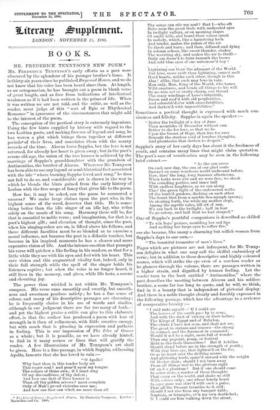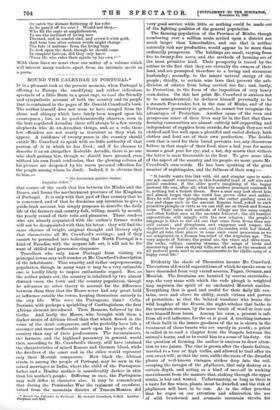BOOKS.
MR. FREDERICK TENNYSON'S NEW POEM.* MR. FREDERICK TENNYSON'S early efforts as a poet were obscured by the splendour of his younger brother's fame. It is thirty-six years since he published Days and Hours, and we do
not know that his voice has been heard since then. At length, as an octogenarian, he has brought out a poem in blank verse of great length, and as free from indications of intellectual weakness as if it had been written in the prime of life. When it was written we are not told, and the critic, as well as the reader, must judge of this " sort of Epic or Rhythmical Romance" in ignorance of the circumstances that might add to the interest of the poem.
The conception of the poetical story is extremely ingenious. Using the few hints supplied by history with regard to the two Lesbian poets, and making free use of legend and song, he has woven a plot which brings them together at different periods• of their lives, and associates them with the scanty records of the time. Alcmus loves Sappho, but the love is not returned, for already her heart is given away; but in the poet's serene old age, the union of the two houses is achieved by the marriage of Sappho's granddaughter with the grandson of Antimenidas, the brother of Alcmus. Wherever Mr. Tennyson has been able to use any legend or semi-historical fact associated with the isle " where burning Sappho loved and sung," he does not fail to do so, and considerable art is shown in the way in which he blends the hints gained from the early history of Lesbos with the free scope of fancy that gives life to the poem.
How far, it may be asked, can the poem be accounted a success ? We make large claims upon the poet who, in the highest sense of the word, deserves that title. He is some- thing better than the idle singer of an idle lay, who relies solely on the music of his song. Harmony there will be, for that is essential to noble verse ; and imagination, for that is a poet's highest gift ; and elevation of thought, since the poet, when his singing-robes are on, is lifted above his fellows, and these different faculties must be so blended as to exercise a moral influence, not because the poet is a didactic teacher, but because in his inspired moments he has a clearer and more expansive vision of life. And the intense emotion that• prompts his verse will quicken a like feeling in his readers, so that for a little while they see with his eyes and feel with his heart. This rare vision and this augmented vitality last, indeed, only in their full strength while the spell of the singer holds his listeners captive ; but when the voice is no longer heard, it still lives in the memory, and gives, while life lasts, a serene and elevating joy.
The power thus wielded is not within Mr. Tennyson's
compass. His verse runs smoothly and sweetly, but smooth- ness and sweetness produce satiety ; he has a, fine sense of colour, and many of his descriptive passages are charming ; he is frequently choice in his use of words and similes, although in our judgment there are far too many of both,—
and yet the highest praise a critic can give to this elaborate effort, is that the author has produced a poem with less of strength in it than of refinement, with little creative energy, but with much that is pleasing in expression and pathetic in feeling. This is our impression of The Isles of Greece as a whole ; but it is possible, as we have already hinted, to find in it many scenes or lines that will gratify the reader. A few illustrations of Mr. Tennyson's art shall
be given. Here is a fine passage, in which Sappho, addressing Apollo, laments that she has loved in vain:— "0 Apollo !
Why host thou in this tender body set This eager soul? and pour'd upon my tongue The echoes of thine own; if I must sing Of my discomfiture, of thy defeat ; And how one dart of Eros keener is Than all thy golden arrows ? must complain Only of Man's proud victories over me; And how one face can witch me more than all
• The Moo of Greece Sappho and Alczus. By Frederick Tennyson. London Macmillan and Co. 1890.
Thy songs can stir my soul ? that I—who oft Have seen the great Gods with undazzled eyes In twilight valleys, or on morning slopes Of sunlit hills, and heard their voices speak In melody, which, like a harpstring keen And tender, makes the pulses of the air To throb and burn ; and then, diffused and dying In solemn echoes, like sweet thunder, shakes The wavering sky, and makes the air to thrill— Daily am doom'd to faint beneath the brows And cold blue eyes of one unlionour'd boy ?
. . . . ..... . . Lightning can thaw the adamant of the World. But love, more swift than lightning, cannot melt Hard hearts, unlike each other, though in this Alas ! alike, that each may love in vain. Man only, Man, King of the World, who tames Wild creatures, and bends all things to his will By no wise art or crafty charm, can thread The crazy windings of Love's labyrinth, Paven and roof'd with old perplexities, And cobwebb'd o'er with cross-fatalities, And darken'd with impossibilities."
Sometimes a poetical thought is expressed with much con- ciseness and felicity. Sappho is again the speaker :— " Better the twilight of a day of Juno Than noontides of December without sun. Bettor to die for love, so that wo lie Upon the breast of Hope, than live for ever Beneath the starless void of loveless thoughts, And phantasies that darken to despair."
Sappho's story of her early days has about it the freshness of youth, and contains many lines that might claim quotation. The poet's ease of versification may be seen in the following brief extract
"As the sun arose On each new day, the sun of our glad souls Dawned on some wondrous world undreamt before. How, thro' the long, long Summer afternoons, When tasks were o'er and we were free, wo shook The sounding portico, and inner hall With endless laughters, as wo ran along Thro' the green light of the embowered walks Of the hush'd gardens, dashing on each other The fount that from a marble Sea-nymph sprang ; Or stealing forth, the while my mother slept, Among the myrtle vales, till set of sun, We ran back in the twilight ; half in fear To go astray, and half that we had strayed."
One of Sappho's youthful companions is described as skilled
"To win boys' praises, moulding her red lips And melting her large eyes to softer fire,'
ere she became, like many a charming but selfish woman from Sappho's days to our own,—
" The beautiful tormenter of men's lives."
Pages which are pictures are not infrequent, for Mr. Tenny- son delights in what one may call the skilful embroidery of verse ; but in addition to these descriptive and highly coloured scenes, which will strike the eye even of a careless reader as he glances through the volume, there are passages written in a higher strain, and dignified by human feeling. Let the reader turn to the book entitled " Antimenidas," where the poet describes the meeting between Alcmus and his soldier- brother, a scene far too long to quote, and he will, we think, find in it a beauty that is independent of pictorial display. And there is a noble thought clearly and forcibly expressed in the following passage, which has the advantage to a reviewer of comparative brevity :-
" I said unto myself= If I could see
The heroes of the earth pass by in arms, And with the dust of victory on their helms ; The Kings of Egypt and of Babylon, The chiefs I have not seen, and shall not see, Tho great in stature and renown—the strong In counsel, and the foremost in command : Would it not be a sight, more full of wonder Than any pageant, pomp, or festival Held to the Gods themselves ? But if Achilles Should stand before mo in the strength of youth ; With that blue eye, that lighten'd on the foe, Or as he leant over the drifting manes And glittering hoofs, spired onward with the weight Of Hector slain; should I not turn away From all things real to the glorious sight Of such a phantom? But if one should come In sober stole, a master of those thoughts That carry on the world, and shake us still With echoes only ; one whose lonely heart In ages gone was stirr'd with such a pulse, That all the Present trembles to it still : Should I not rise from any banquet table, Nuptials, or triumphs, ev'n my own death-bed; If I could see him walking down the street,
Or catch the distant fluttering of his robe
As he pass'd off for ever ? Would not they,—
Who fill the seats at amphitheatres, To see the lordliest of living men Throned, and in scarlet clad, and crown'd with gold, And hear him utter solemn words might change The fate of nations—from the living turn To look upon the dead, though he should come In simplest fashion, did they only know 'Twas He who rules their spirits by his own ?' " With these lines we must close our notice of a volume which will interest many readers, apart from its intrinsic merit as a poem.



















































 Previous page
Previous page